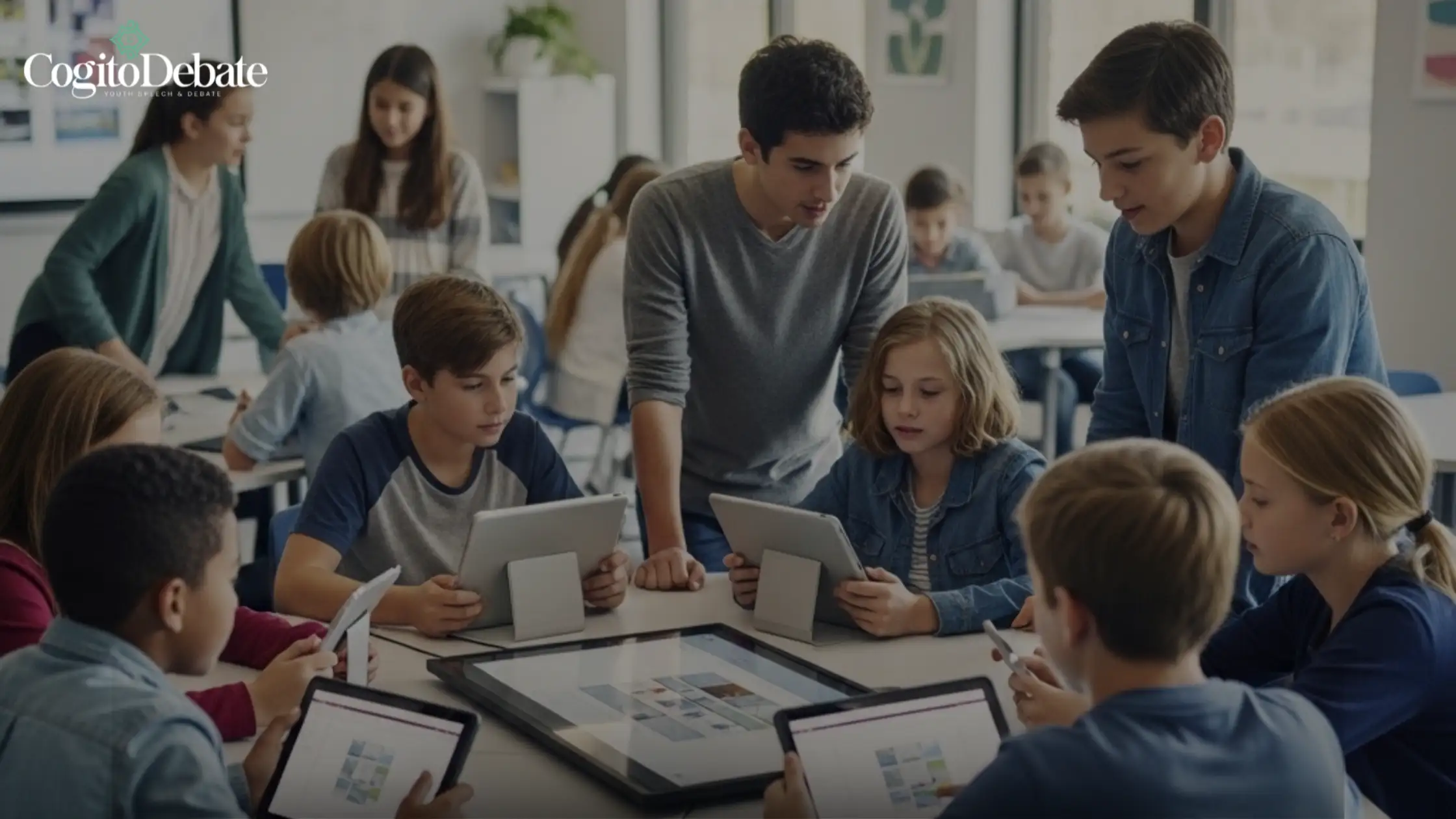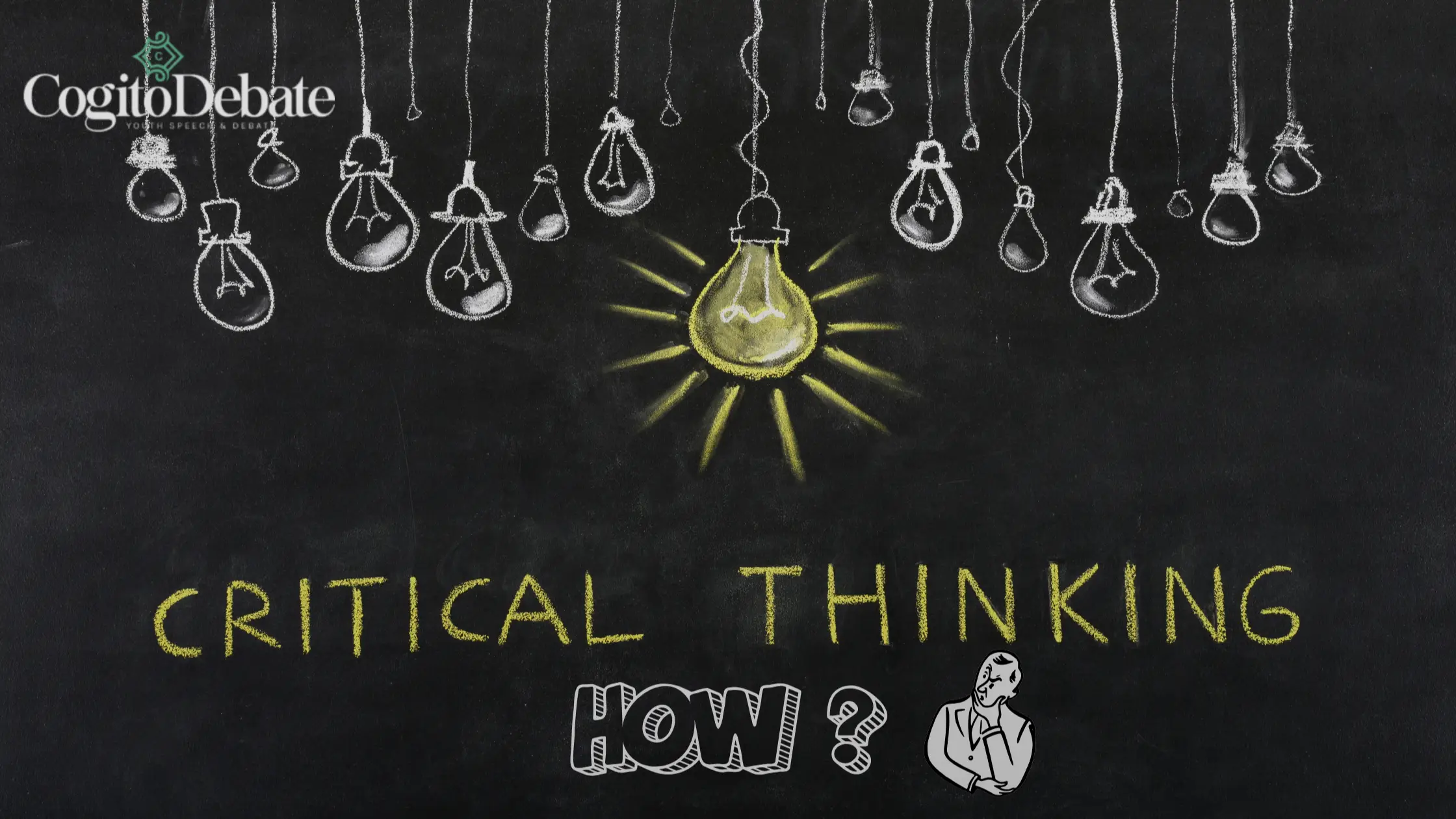My child knows all the answers, but struggles when asked why they believe them.
This sentence has become a common refrain among parents and teachers. In an age flooded with information, children are better at memorizing facts than ever before. But beneath this surface of academic achievement lies a worrying truth: kids are losing the ability to analyze, question, and think for themselves. The foundation of critical thinking in children is eroding—and it’s happening quietly, without many noticing.
At Cogito Debate, we believe this is more than just an educational concern—it’s a cultural crisis. In this article, we’ll explore why critical thinking is vanishing from childhood learning, what’s driving this shift, and how we can reclaim it before it’s too late.
The Disappearing Art of Thinking Deeply

Once the foundation of great education, critical thinking is being edged out of the modern learning experience. Many schools focus on ticking off curriculum checkboxes rather than nurturing thoughtful analysis. Multiple-choice tests encourage surface-level understanding, while rigid lesson plans leave little room for curiosity.
In this environment, critical thinking in children is often underdeveloped. Kids are told the answers but not taught how to ask the right questions. Without developing their own voice or judgment, they may perform well on paper but struggle in real-life problem-solving.
The Rise of Passive Learning
With the rapid rise of technology, children today are exposed to an overwhelming amount of information. But rather than absorbing and critically engaging with that information, many students are passively consuming it. Social media, video streaming, and digital platforms like YouTube provide endless entertainment but leave little room for engaging thought. Kids are bombarded with content but not encouraged to reflect, analyze, or critique it.
In this environment, critical thinking in children can become an afterthought. As kids scroll through endless streams of information without questioning it, they miss out on opportunities to develop the skills necessary for deep understanding. This passive consumption prevents them from engaging in meaningful dialogue, critical analysis, or problem-solving—all skills that are foundational to lifelong success.
The Over-Scheduled Childhood
In today’s fast-paced world, kids are busier than ever before. After school, many are enrolled in a slew of extracurricular activities: soccer, piano lessons, coding clubs, debate camps and more. While these activities are important for building well-rounded individuals, they often leave little room for free time or independent thinking.
In a world where children’s schedules are packed to the brim, there’s little space left for the kind of free play and imaginative thinking that fosters critical thinking in children. Research has shown that unstructured playtime allows kids to explore their environment, develop creative solutions, and ask “what if?” questions that challenge the status quo. Without this time, kids miss out on the opportunities to think independently and question their surroundings.
The Role of Education Systems in Shaping Critical Thinking

The traditional education system, with its emphasis on rote memorization and standardized testing, isn’t helping either. Many teachers are under immense pressure to cover the curriculum quickly and prepare students for exams. As a result, classrooms often prioritize the memorization of facts over the development of critical thinking skills.
This emphasis on standardized testing leaves little room for open-ended discussions, critical questioning, or creative problem-solving. Kids learn to regurgitate information but don’t have the tools to assess it or apply it in real-life situations. While facts are important, it’s the ability to question those facts, explore different perspectives, and analyze situations critically that forms the basis of a well-rounded thinker.
What’s at Stake?
When critical thinking in children is sidelined, the consequences are far-reaching. A society without critical thinkers is one where individuals can easily fall prey to misinformation, propaganda, and shallow arguments. Kids who don’t learn how to question the world around them will struggle to navigate an increasingly complex world.
Moreover, critical thinking is not just about academic success—it’s about building engaged, informed, and responsible citizens. A lack of critical thinking skills hinders kids’ ability to evaluate different viewpoints, participate in meaningful discussions, and make decisions based on reasoned judgment.
How Speech and Debate Programs Help Foster Critical Thinking
One of the most effective ways to develop critical thinking in children is through speech and debate programs. These programs offer children a structured environment where they can practice articulating their thoughts, listening to opposing viewpoints, and refining their reasoning skills.
At Cogito Debate, we believe in the power of debate as a tool for developing critical thinking. When students are encouraged to argue both sides of an issue, they are forced to think deeply, consider multiple perspectives, and refine their ideas. This process not only strengthens their ability to reason but also helps them develop confidence in their ability to engage with complex topics.
The Cognitive Benefits of Critical Thinking in Debate
Debate encourages children to think critically about a variety of topics. They are required to research both sides of an issue, critically evaluate evidence, and present their arguments in a clear, persuasive manner. This fosters several cognitive benefits:
- Improved Problem-Solving Skills: Debating requires children to think quickly, analyze information on the spot, and develop creative solutions to complex issues.
- Enhanced Communication Skills: As kids practice articulating their ideas in front of others, they develop stronger verbal communication skills, which are essential for expressing ideas clearly and persuasively.
- Open-Mindedness: Debate forces children to consider multiple viewpoints and think beyond their initial biases. This encourages empathy, curiosity, and a deeper understanding of different perspectives.
Self-Confidence: Regular practice in speech and debate builds confidence. Kids learn to defend their ideas, which helps them become more assertive and willing to engage in thoughtful discussions.
Taking Action: How We Can Reclaim Critical Thinking

To counter the decline in critical thinking in children, we need to take action in both the home and the classroom. Here are a few steps we can take to foster critical thinking:
- Encourage Questions: Ask your child open-ended questions that require more than a simple yes or no answer. Encourage them to explore different possibilities and consider alternative perspectives.
- Create Time for Reflection: Allow your child to spend time reflecting on what they’ve learned. Whether through journaling, conversation, or creative expression, this helps them internalize their ideas and develop a deeper understanding.
- Promote Independent Learning: Encourage your child to explore topics on their own, rather than relying solely on textbooks or pre-packaged information. This allows them to engage more deeply with the subject matter.
- Get Involved in Debate and Discussion: Encourage your child to join debate clubs, attend discussions, or engage in thoughtful conversations. At Cogito Debate, we offer programs that specifically focus on developing critical thinking in children through structured argumentation and analysis.
Emphasize the Importance of Failure: Teach your child that failure is part of the learning process. When they make mistakes, encourage them to reflect on what went wrong and how they can improve next time.
Conclusion: The Need for Action
The decline of critical thinking in children is a silent crisis, but it’s not too late to reverse the trend. By encouraging curiosity, fostering open dialogue, and providing children with the tools to think critically, we can help the next generation navigate a complex world with confidence, creativity, and reasoned judgment.
At Cogito Debate, we are committed to providing children with the skills they need to thrive in an information-rich world. Through debate, we offer a platform for young minds to grow, think critically, and engage in the conversations that will shape their futures.
The ability to think critically isn’t just an academic skill—it’s a life skill. Let’s work together to ensure that critical thinking in children is not lost but nurtured for generations to come.
FAQs
Q1. What is critical thinking in children?
A: Critical thinking in children refers to their ability to analyze, evaluate, and make reasoned judgments rather than accepting information at face value. It involves questioning assumptions, solving problems creatively, and thinking independently.
Q2. Why is critical thinking important for kids?
A: It helps kids become better problem-solvers, make informed decisions, and develop strong communication skills. In today’s world, where misinformation is widespread, critical thinking empowers children to navigate complex situations and think for themselves.
Q3. What causes a decline in critical thinking among children today?
A: Factors include passive consumption of digital media, over-reliance on rote learning in schools, standardized testing, and overly structured schedules that leave little room for independent exploration and inquiry.
Q4. How can parents help their children develop critical thinking skills?
A: Parents can encourage open-ended questions, allow time for unstructured play, involve kids in decision-making, and promote discussion of multiple viewpoints. Engaging them in debates or Socratic dialogue also helps greatly.
Q5. Can debate programs improve critical thinking in children?
A: Absolutely. Debate teaches children to research, consider both sides of an issue, articulate arguments, and listen critically—core components of critical thinking. Programs like Cogito Debate are specifically designed to build these essential skills.
